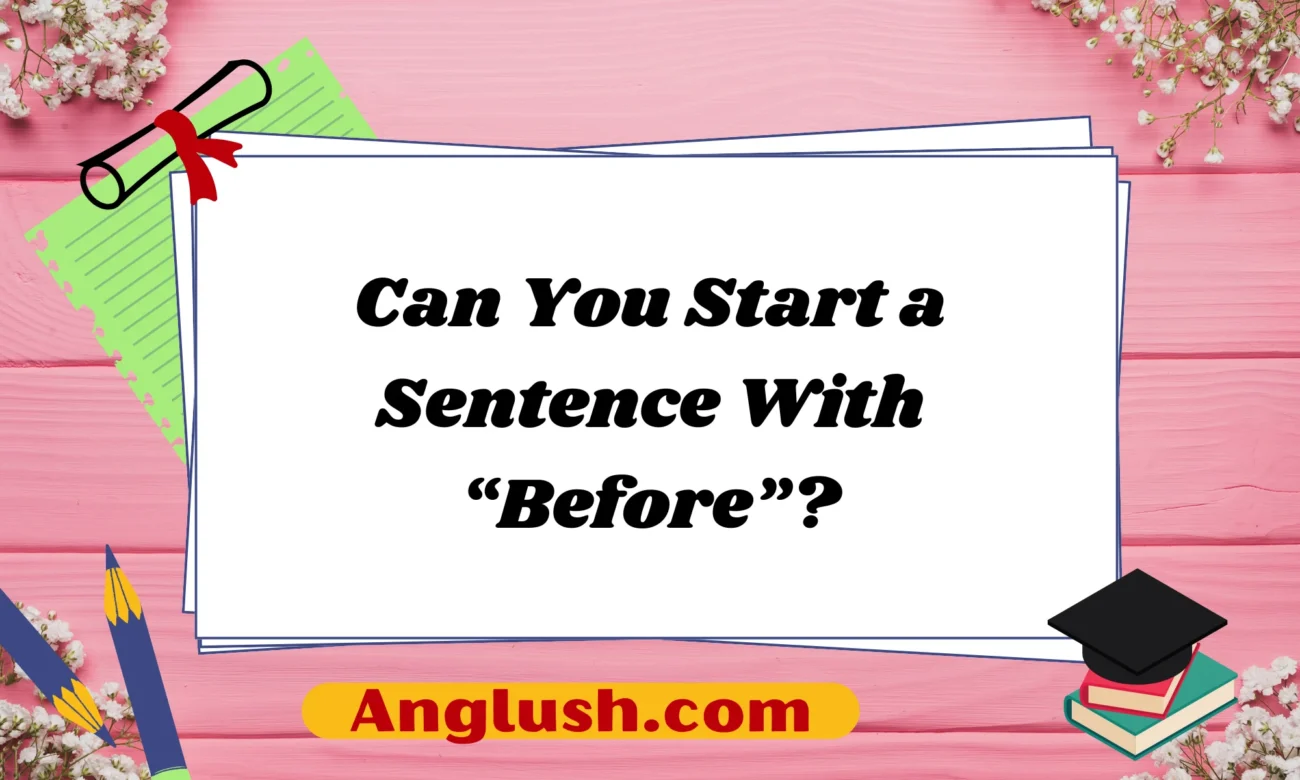Introduction
The English language is full of grammatical rules, but one common question is whether it is acceptable to start a sentence with “before.” The short answer is yes! You can begin a sentence with “before” in both written and spoken English. However, the key to using “before” correctly lies in understanding sentence structure, context, and tone.
In this article, we’ll explore:
- When and how to start a sentence with “before”
- Alternative ways to express the same idea
- Examples of both formal and casual usage
- Tips for writing polished and professional sentences
By the end of this guide, you’ll have a solid grasp of how to use “before” effectively and how to adjust your phrasing based on the situation.
Can You Start a Sentence With “Before”?
Yes, you can start a sentence with “before.” “Before” is a subordinating conjunction, meaning it introduces a dependent clause that provides additional information about time or sequence. When you use “before” at the beginning of a sentence, it is typically followed by a comma to separate the dependent and independent clauses.
Examples:
✅ Before she arrived, we had already started the meeting.
✅ Before you make a decision, consider all the options carefully.
✅ Before going to bed, I always read a book.
In each case, “before” introduces an event that happens earlier than the main clause.
How to Use “Before” in Different Contexts
Before” is a versatile word that can be used in formal, professional, and casual settings. Let’s look at how it fits into different scenarios.
1. Formal Writing
In formal writing, “before” is often used to indicate a sequence of events in reports, research papers, and business communication.
Examples:
- Before submitting your proposal, ensure all the required documents are attached.
- Before the implementation of the new policy, employees were required to complete additional training.
- Before finalizing the agreement, both parties must review the contract.
In professional writing, “before” helps clarify procedures and timelines.
2. Conversational and Casual Use
In everyday conversation or informal writing, “before” can introduce personal experiences, opinions, or actions.
Examples:
- Before we go to the party, let’s grab some food.
- Before you say anything, just hear me out!
- Before heading to the beach, don’t forget sunscreen.
When speaking casually, people often drop the subject (“I” or “we”) in sentences like “Before going out, let’s check the weather.”
Polite and Professional Alternatives to “Before”
If you’re writing a formal email, business document, or academic paper, you may want to consider alternatives to “before” to vary your sentence structure or make your writing sound more polished.
Here are some refined alternatives:
| Alternative | Example Sentence | Tone |
| Prior to | Prior to the meeting, please review the agenda. | Formal/Professional |
| Ahead of | Ahead of the deadline, we need to complete the final edits. | Professional |
| In advance of | In advance of your appointment, please complete the required forms. | Formal |
| Earlier than | Earlier than expected, the package arrived at our doorstep. | Neutral |
| Beforehand | Beforehand, we should discuss the project details. | Neutral/Casual |
Each alternative offers a slightly different tone and level of formality.
10 Texting Examples That Use “Before” Effectively
Here are 10 text-friendly examples that use “before” in an easy-to-read format:
- Before you leave, can you grab my keys?
- Before the show starts, let’s get some snacks.
- Before I forget, happy birthday!
- Before heading out, check the weather.
- Before we make plans, are you free this weekend?
- Before your flight, don’t forget to charge your phone.
- Before we start, do you have any questions?
- Before replying, think about what you want to say.
- Before our call, I’ll send you the details.
- Before you go to bed, let’s catch up!
These examples are clear, concise, and optimized for readability.
Choosing the Best Alternative Based on Context
When deciding whether to use “before” or an alternative, consider the tone, audience, and purpose of your sentence.
- Use “before” in both formal and informal writing when clarity and simplicity are important.
- Use “prior to” or “in advance of” in professional settings where a more polished tone is needed.
- Use “ahead of” in business or corporate communication for a structured tone.
- Use “earlier than” or “beforehand” in casual or neutral contexts for variety.
Final Thoughts
Starting a sentence with “before” is grammatically correct and widely used in both spoken and written English. Whether you’re writing formally or casually, understanding the nuances of “before” and its alternatives allows you to communicate more effectively.
By using different sentence structures and selecting the appropriate wording based on your audience, you can ensure clarity and professionalism in any context.

